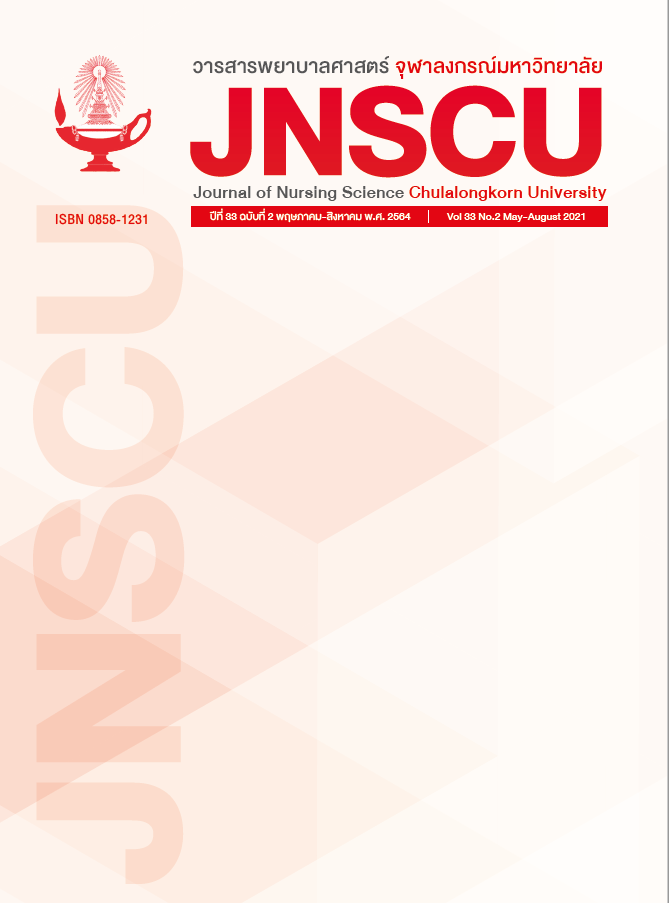ผลของการสนับสนุนทางสังคมแบบกลุ่มต่อการทำหน้าที่ของ ผู้ป่วยโรคอารมณ์แปรปรวนสองขั้ว
คำสำคัญ:
โรคอารมณ์แปรปรวนสองขั้ว, การสนับสนุนทางสังคมแบบกลุ่ม, การทำหน้าที่บทคัดย่อ
วัตถุประสงค์: เพื่อเปรียบเทียบการทำหน้าที่ของผู้ป่วยโรคอารมณ์แปรปรวนสองขั้วก่อนและหลังได้รับการสนับสนุนทางสังคมแบบกลุ่ม และเปรียบเทียบการทำหน้าที่ของผู้ป่วยโรคอารมณ์แปรปรวนสองขั้วที่ได้รับโปรแกรมการสนับสนุนทางสังคมแบบกลุ่มกับกลุ่มที่ได้รับการพยาบาลตามปกติ
รูปแบบการวิจัย: การวิจัยกึ่งทดลอง
วิธีดำเนินการวิจัย: กลุ่มตัวอย่าง คือ ผู้ป่วยโรคอารมณ์แปรปรวนสองขั้วอายุที่รับบริการที่แผนกผู้ป่วยนอก โรงพยาบาลพระศรีมหาโพธิ์ จำนวน 40 คน ซึ่งมีคุณสมบัติตามเกณฑ์ โดยได้รับการจับคู่ (Matched pair) และสุ่มเข้ากลุ่มทดลองและกลุ่มควบคุม จำนวนกลุ่มละ 20 ราย กลุ่มทดลองได้รับการเข้าร่วมโปรแกรมการสนับสนุนทางสังคมแบบกลุ่ม เป็นระยะเวลา 4 สัปดาห์ ส่วนกลุ่มควบคุมได้รับการพยาบาลตามปกติ เครื่องมือที่ใช้ในการทดลองได้แก่ 1) การสนับสนุนทางสังคมแบบกลุ่ม และ 2) แบบสอบถามการทำหน้าที่ของผู้ป่วยโรคอารมณ์แปรปรวนสองขั้ว เครื่องมือทุกชุดผ่านการตรวจสอบความตรงตามเนื้อหาจากผู้ทรงคุณวุฒิ 5 ท่าน เครื่องมือชุดที่ 2 มีค่าสัมประสิทธิ์แอลฟาของครอนบาคเท่ากับ .87 วิเคราะห์ด้วยสถิติเชิงพรรณา และสถิติทดสอบที (t-test)
ผลการวิจัย 1)การทำหน้าที่ของผู้ป่วยโรคอารมณ์ปแรปรวนสองขั้วหลังได้รับการสนับสนุนทางสังคมแบบกลุ่มสูงกว่ากลุ่มที่ได้รับการพยาบาลตามปกติ อย่างมีนัยสำคัญทางสถิติที่ระดับ.05 และ 2) การทำหน้าที่ของผู้ป่วยโรคอารมณ์แปรปรวนสองขั้วก่อนและหลังได้รับการสนับสนุนทางสังคมสูงกว่ากลุ่มที่ได้รับการพยาบาลตามปรกติ อย่างมีนัยสำคัญทางสถิติที่ระดับ .05
สรุป โปรแกรมการสนับสนุนทางสังคมแบบกลุ่มส่งผลต่อการสร้างเสริมการทำหน้าที่ของผู้ป่วยโรคอารมณ์แปรปรวนสองขั้ว
เอกสารอ้างอิง
Lueboonthawatchai O. Psychiatric nursing.
th ed. Bangkok: Chulalongkorn University
Press; 2013.
Townsend MC. Psychitric Mental Health
Nursing: Concept of care in Evident
Based Practice. 5th ed. Philadephia: F.A.
Davis Company; 2006.
Lortrakul M, Sukanich P. Ramathibodi
psychiatry. 2nd ed. Bangkok: Beyond
Enterprise; 2007.
Health Data Center. Number of psychiatric
outpatients who received services
classified by disease group and rights in
[internet]. 2017 [cited 2018 May 23].
Available from: https://hdcservice.
moph.go.th/hdc/reports/report.
Medical records department, Phra Sri Maha
Pho Hospital. Medical statistics database.
Ubon Ratchathani: Phra Sri Maha Pho
Hospital; 2018.
Kongsakon R, Sartrungphak S, Rojananirankit
A, Buranachet U. Development of the
Montgomery Asberg Depression Rating
Scale (MADRS) Thai version. J Psychiatr
Assoc Thailand 2003: 48(4): 211-9.
(in Thai)
Lortrakul M, Sukanich P. Ramathibodi
psychiatry. 3nd ed. Bangkok: Beyond
Enterprise; 2012.
Leelahanat T, Ruangkanchanaset S, Kongsakorn
R. Lithium with lithium in combination
with Carbamazepine in the treatment
of bipolar disorder: a cost-effectiveness
analysis. J Psychiatr Assoc Thailand
; 47(2): 97-110. (in Thai)
Harvey PD. Mood symptoms, cognition,
and everyday functioning: in major
depression, bipolar disorder, and
schizophrenia. Innov Clin Neurosci 2011;
(10): 14-8.
Rosa AR, Sanchez-moreno J, Matinez-Aran
A, Salamero M, Torrent C, Reinares M,
et al. Validity and reliability of functioning
assessment shot test (FAST) in bipolar
disorder. Clin Pract Epidemiology Ment
; 3(5): 1-8. Doi: 10.1186/1745-0179-
-5.
Suratewamit S, Soonthomchaiw R. Selected
Factors Related to Functioning of
Patients with Bipolar Disorder. JPNMH
; 25(1): 63-74. (in Thai)
Strauss JL, Johnson SL. Role of treatment
alliance in the clinical management of
bipolar disorder: stronger alliances
prospectively predict fewer manic
symptoms. Psychiatry Res 2006; 145(2-3):
-23.
Oostervink F, Boomsma MM, Nolen WA.
Bipolar disorder in the elderly; different
effects of age and of age of onset.
J Affect Disord 2009; 116(3): 176-83.
House JS, Kahn RL, McLeod JD, Williams D.
Measures and concepts of social support.
In: Cohen S, Syme SL, editors. Social
support and health. USA: Academic
Press; 1985. p. 83-108.
Chaiyaphong P, Aungsuroch Y, Suktrakul S.
The effect of life goals therapy program
on functioning in patients with bipolar
disorders. RTNNMD journal 2019; 46(1):
-82. (in Thai)
Marram GD. The group approach in nursing
practice. 2nd ed. Saint Louis: C. V. Mosby;
Tanabodee-tummajaree P, Khomchai B.
The effect of group psyches education
on quality of life in patients with bipolar
disorder inpatient department. JPNMH
; 27(1); 62-78. (in Thai)
Weinstock LM, Miller IW. Psychosocial
predictors of mood symptoms 1 year
after acute phase treatment of bipolar
I disorder. Compr Psychiatry 20105; 1(5):
-503.
Rosenfarb IS, Miklowitz DJ, Goldstein MJ,
Harmon L, Nuechterlein KH, Rea MM.
Family Transactions and Relapse in
Bipolar Disorder. Family Process 2004;
(1): 5-14.
ดาวน์โหลด
เผยแพร่แล้ว
ฉบับ
ประเภทบทความ
สัญญาอนุญาต

อนุญาตภายใต้เงื่อนไข Creative Commons Attribution-NonCommercial-NoDerivatives 4.0 International License.
##default.contextSettings.thaijo.licenseTerms##


